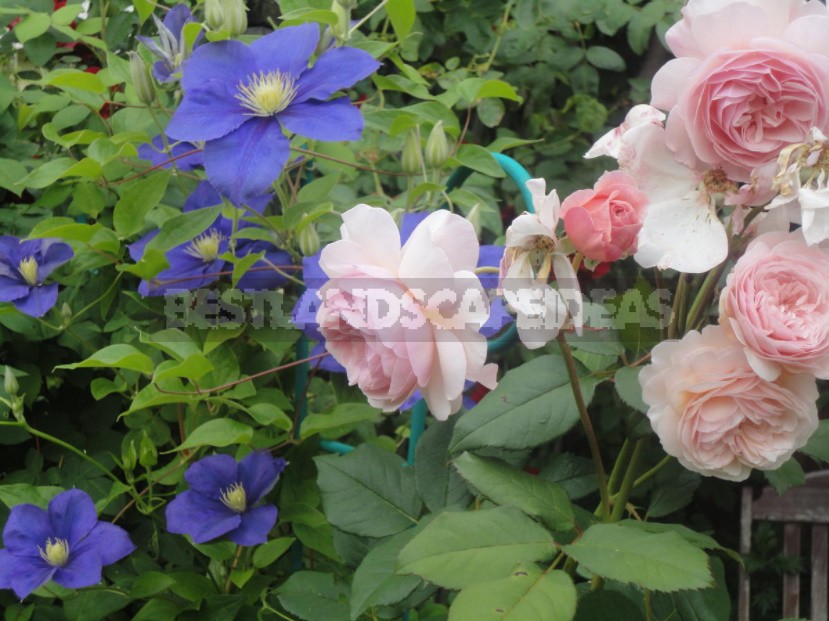
The rose, charming and beautiful, has long been considered the Queen of the garden — the most magnificent flower. It is known that she is a very capricious beauty, and choosing a suitable companion for her is quite a difficult task.
However, the generally recognized classic pair of ideal partners is the rose and clematis. He, like no other, can subtly emphasize the beauty of roses or take their chic flowers in a decent frame. However, the combination of these plants has its own nuances, which are worth talking about.
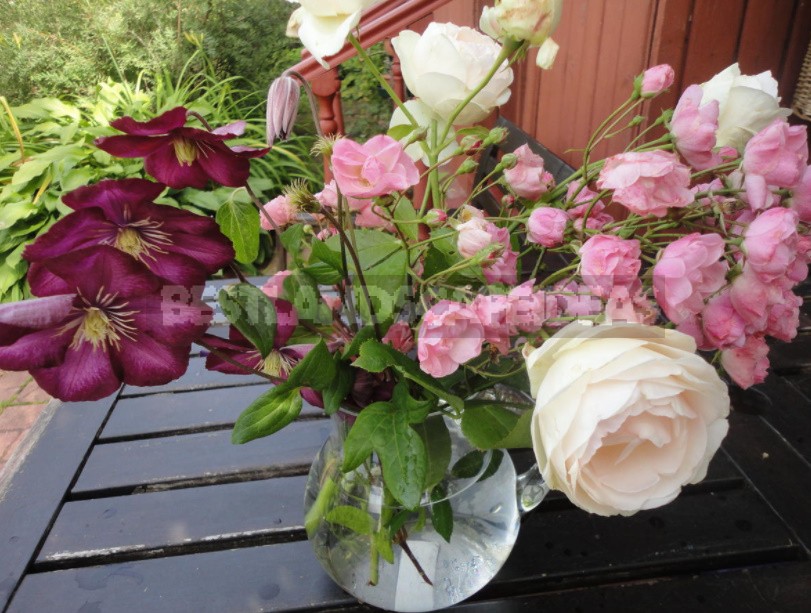
Clematis and rose: pros and cons
No doubt, at first glance it may seem that this is an ideal partnership. Sometimes you get amazing compositions. For example-as in the photo below.
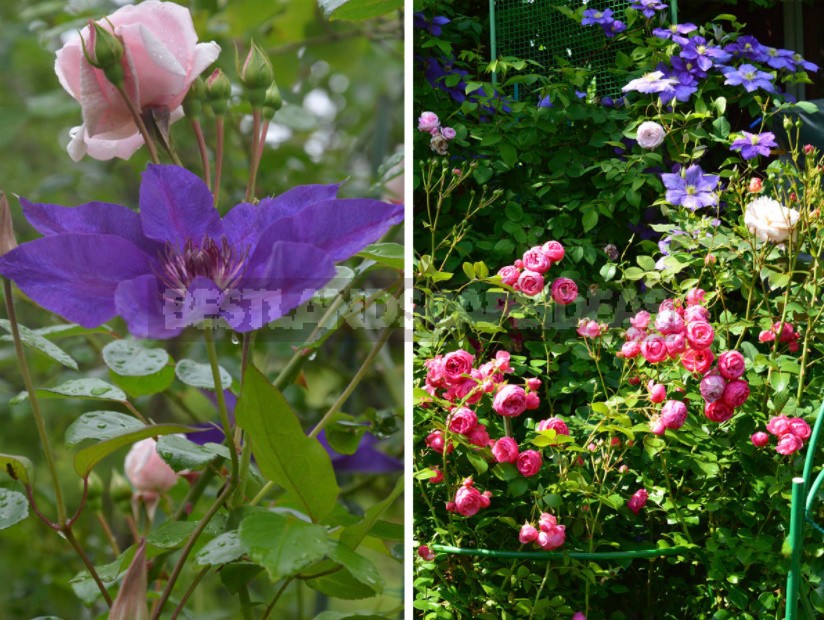
And here is another picture of a perfect partnership-a rose ‘Red Eden Rose’ surrounded by clematis ‘Eetika’ and ‘Marmori’. An example of absolute color harmony!
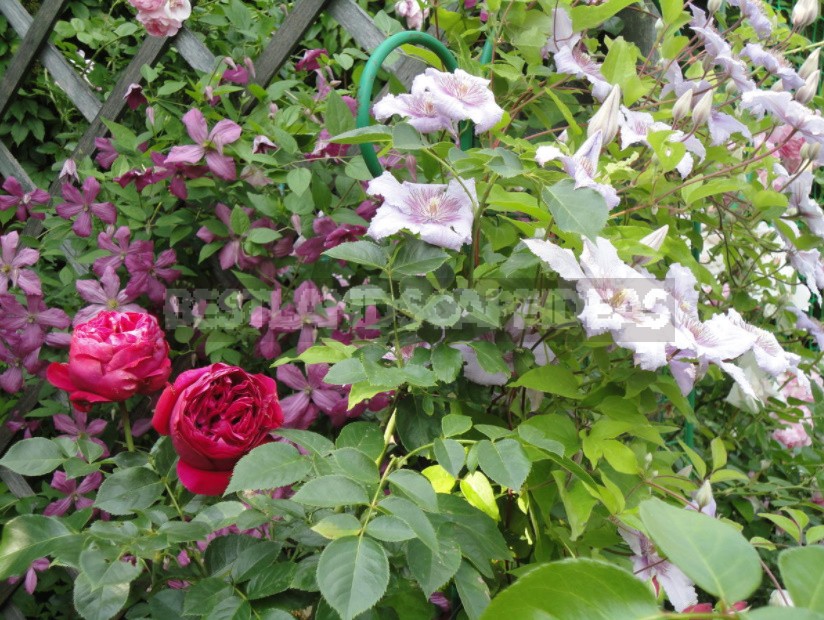
On the one hand, these plants meet the same environmental requirements: both are equally fond of the sun and neutral soils. However, hurry up to plant clematis to roses (in this order, and not otherwise!) do not do this without studying their nature and characteristics.
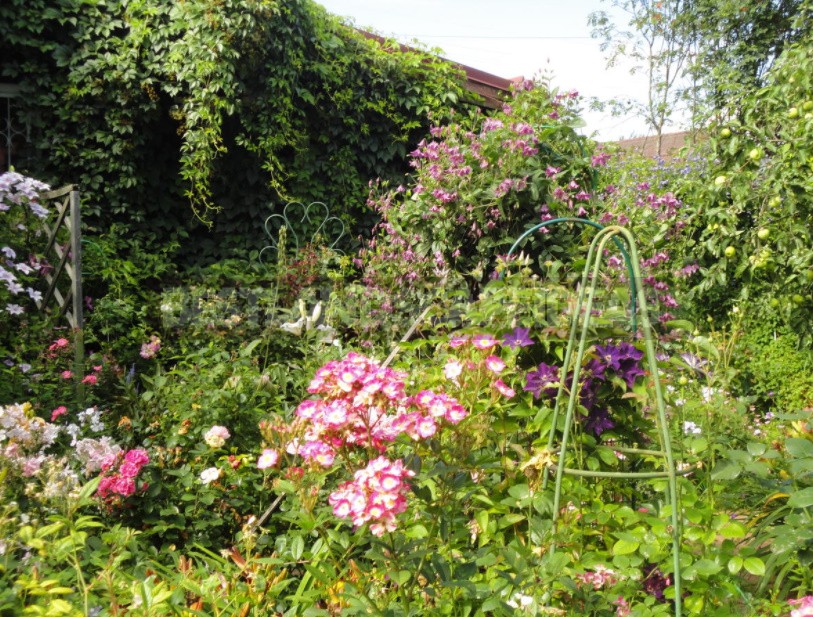
Prohibitions and restrictions
In order to choose harmonious compositions, you need to be well versed in the clematis pruning groups (and this is a fundamental point in their classification!), which now have a huge number of varieties. Some of them are absolutely not suitable for accompanying roses. Let’s start with the fact that Atragene alpina, A. sibirica and A. macropetala are forced to solo separately. At the time when they bloom (and this is may-June), roses are just recovering from winter shelter and spring pruning.
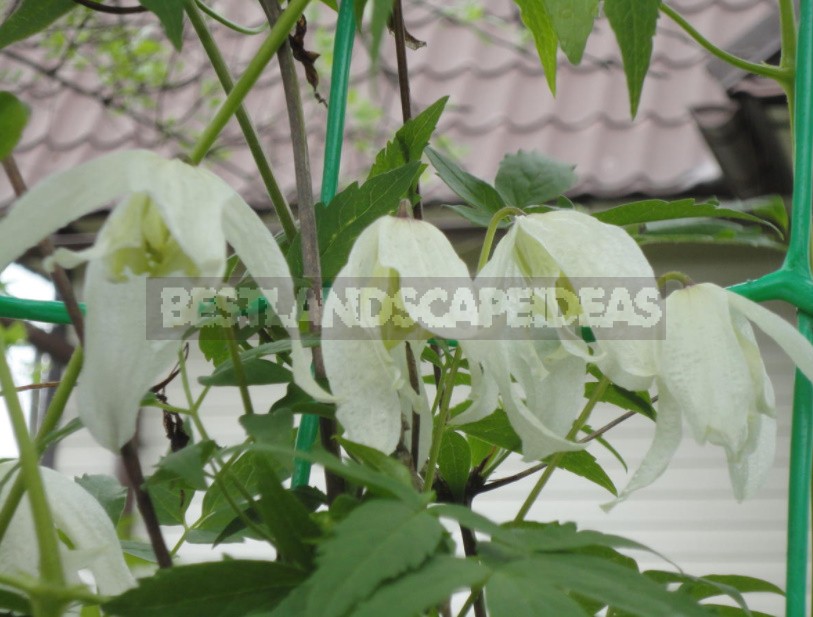
These clematis of the I-th group of pruning are known to successfully winter on supports, and their presence on the ground in flower beds is inappropriate. Let them into the rose garden, no matter how tempting it may seem, should not be.
Hybrid clematis group II is logically very convenient to grow among roses, as they need shelter and can pass the cold winter months with roses. But there are limitations here, too. Do not get carried away with planting too lush and luxurious plants in the rose garden. They are so self-sufficient in their splendor that they will compete with roses. For example, it is better not to plant Terry varieties of clematis next to rose bushes, no matter how much you would like it. This combination is likely to be rather unsuccessful. An old Terry variety ‘Purpurea Plena Elegans’ or a luxuriously blooming modern hybrid ‘Multi Blue’ looks too heavy in the rose garden.
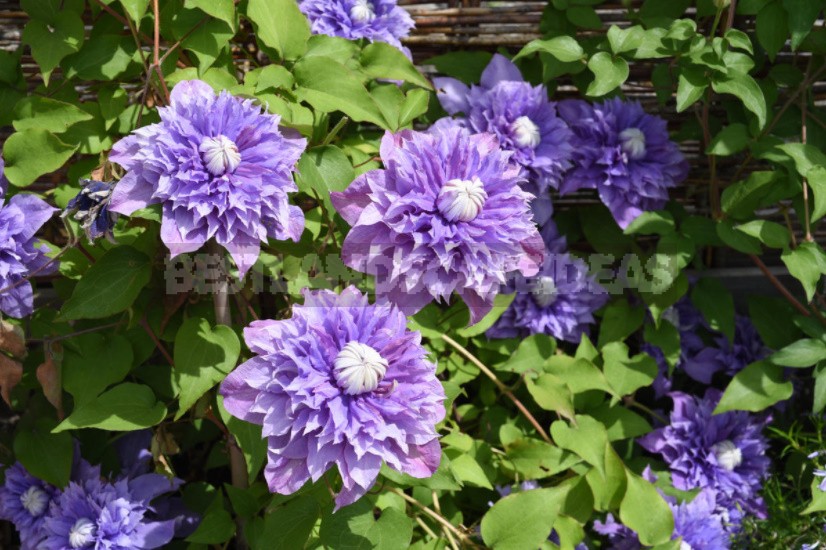
As for clematis of the third group of pruning, it is also necessary to use them carefully in the rose garden. By the time of flowering, they successfully coincide with blooming roses. But! For our purposes, it is absolutely not suitable for tall specimens-2.5 m or more in height. It is better to grow them as a background plant-backstage. Leave them to solo somewhere on a trellis, column, or arch.
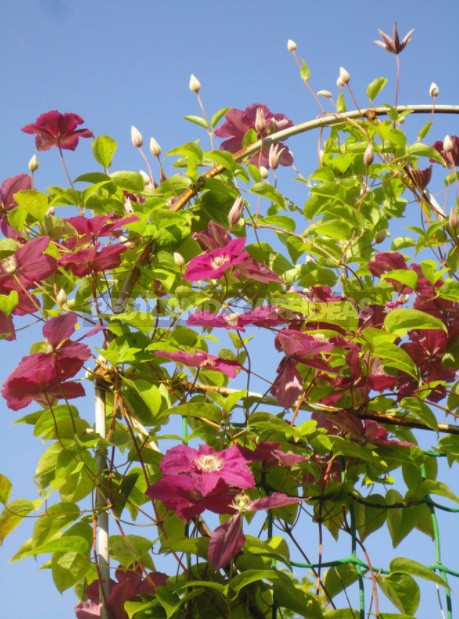
Do not plant clematis of this group with low-growing varieties of roses (groundcover, tea-hybrid and floribund) for the reason that they simply drown them out. Lianas will unwittingly look for support, leaf stalks twining around the shoots of roses. In such a suffocating embrace, roses are unlikely to like it. In addition, without harm to the roses, you will not be able to get rid of clematis shoots in the fall, they are very strong. Experience has shown that it is necessary to place luxuriantly blooming clematis at a distance, making them a backstage that creates a background on which the rose bushes will look even more spectacular.
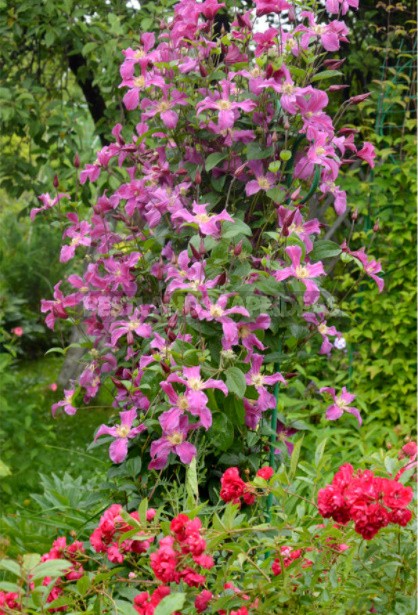
Roses are best suited to clematis from the Integrifolia group (group III pruning). These are extremely delicate plants that do not know how to “hang themselves” on a neighbor — their whips must be tied up. Clematis of this group can be safely planted to roses, since they coincide in flowering time. And in the fall, they can easily be cut to ground level.
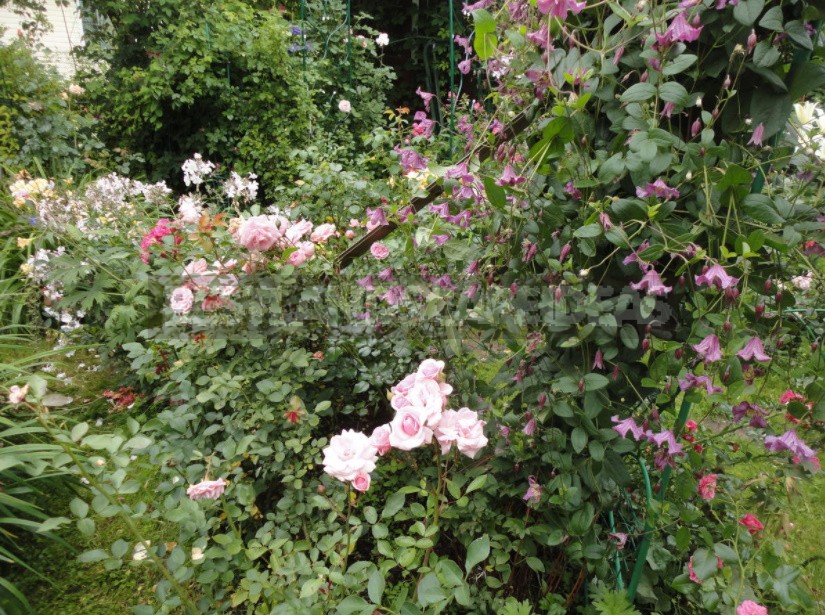
Most of them have small flowers of an exquisite shape, similar to a bell.
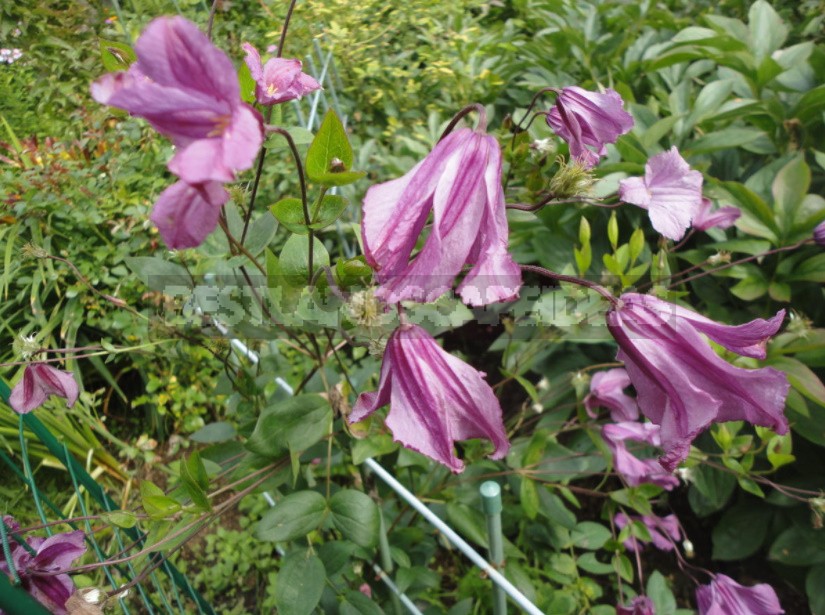
The petals of others look like wrapped propellers (‘Blue bird’, ‘Petit Faucon’).
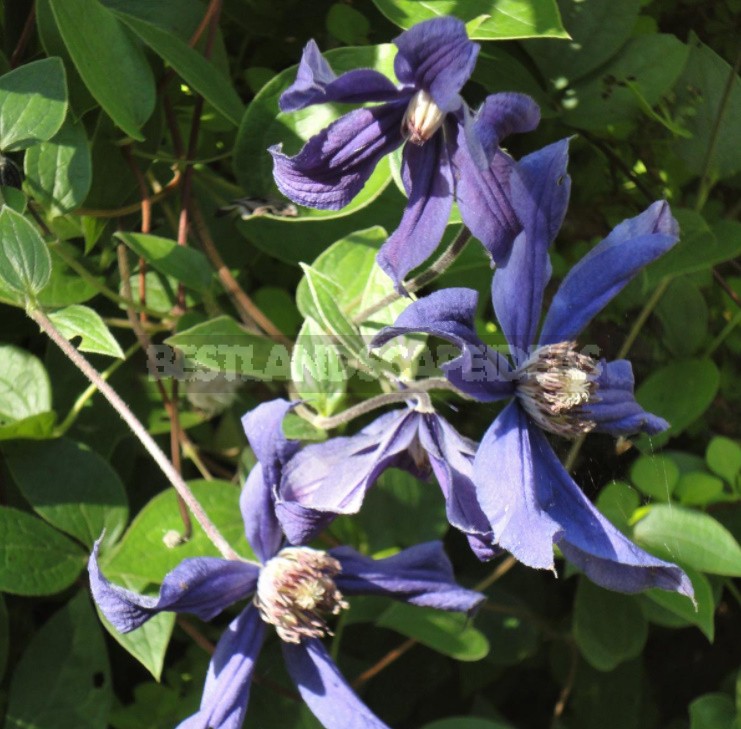
Color harmony
The most versatile color in compositions with roses is, without a doubt, blue and all its nuances. See how good these clematis varieties are!
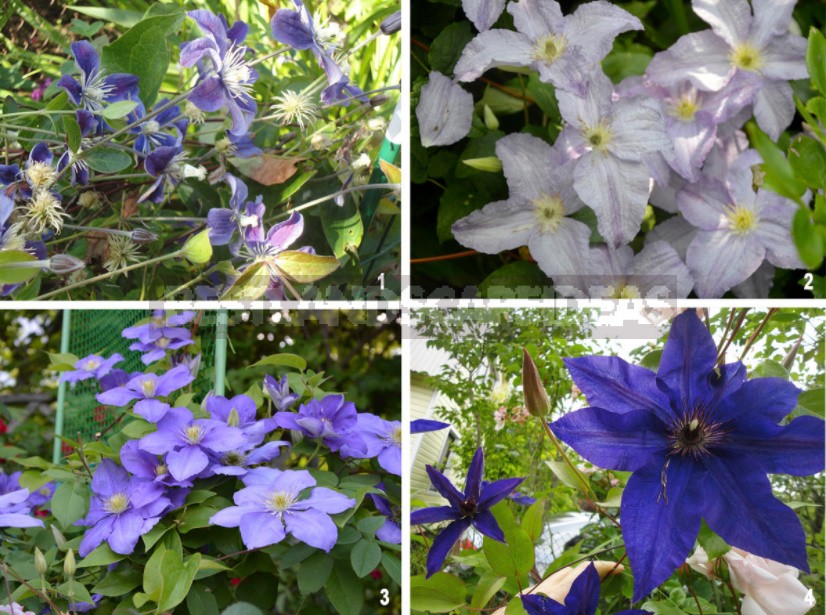
1 – ‘Arabella’; 2-Clematis integrifolia ‘Dominika’ with lavender petals; 3-a magnificent variety of Polish selection ‘General Sikorski’; 4 — azure-blue flowers of clematis’ the President ‘ will decorate any flower garden.
A great combination of rose ‘New Dawn’ with blue clematis flowers.
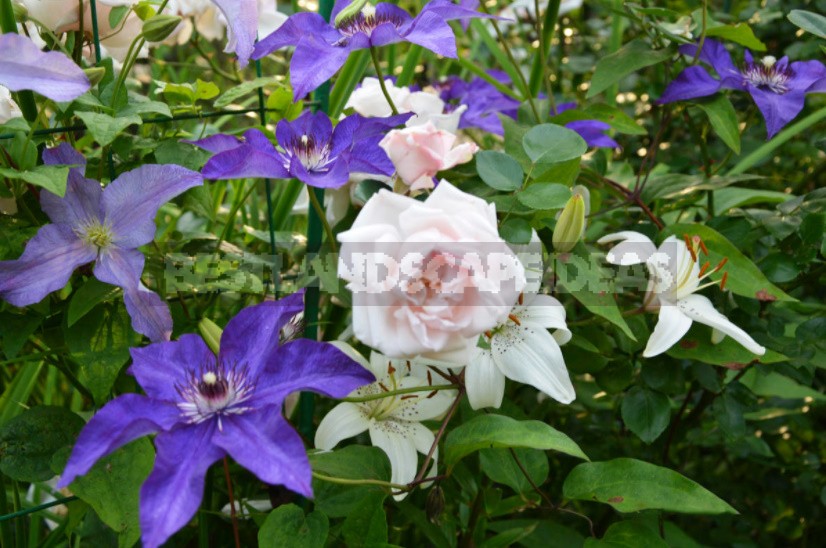
‘Étoile Violette’ is unpretentious, easy-to-crop clematis of group III pruning, blooms profusely almost all summer long. Creates a great background for roses.
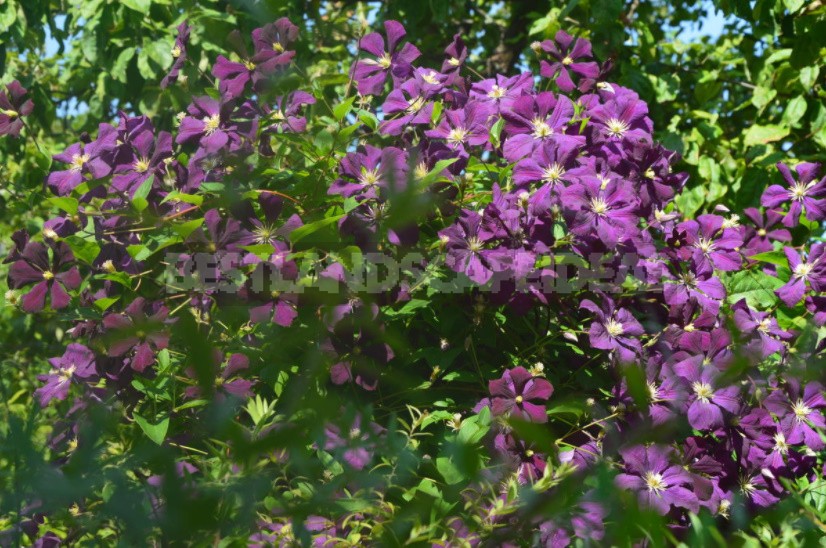
The ‘Mrs Cholmondeley’ variety with flowers of a piercing sky-blue hue is a good neighbor for roses of any color.
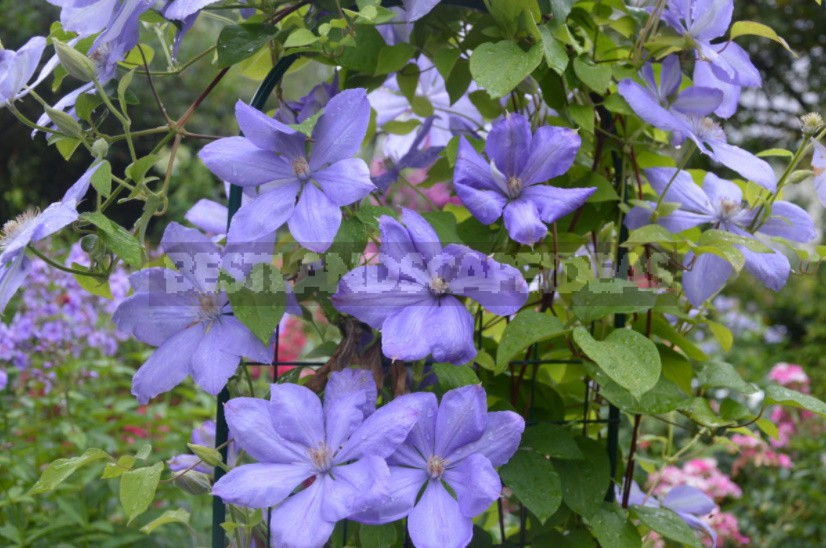
Create an excellent company for the Queen of the garden velvety, rich dark purple, well-known variety ‘Warszawska Nike’ (‘Warsaw night’). Its flowers change color depending on the lighting.
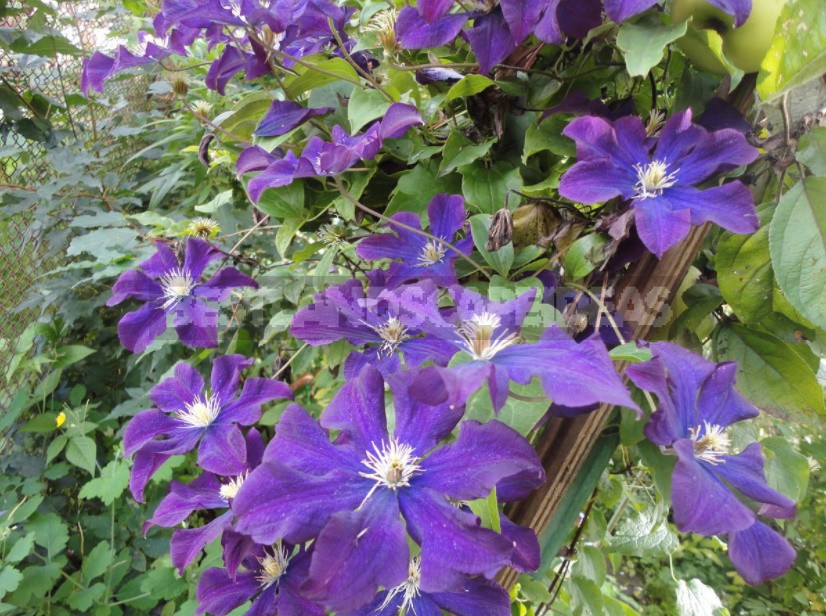
Clematis varieties of these shades are perfectly combined with roses of any color, both warm and cold tones.
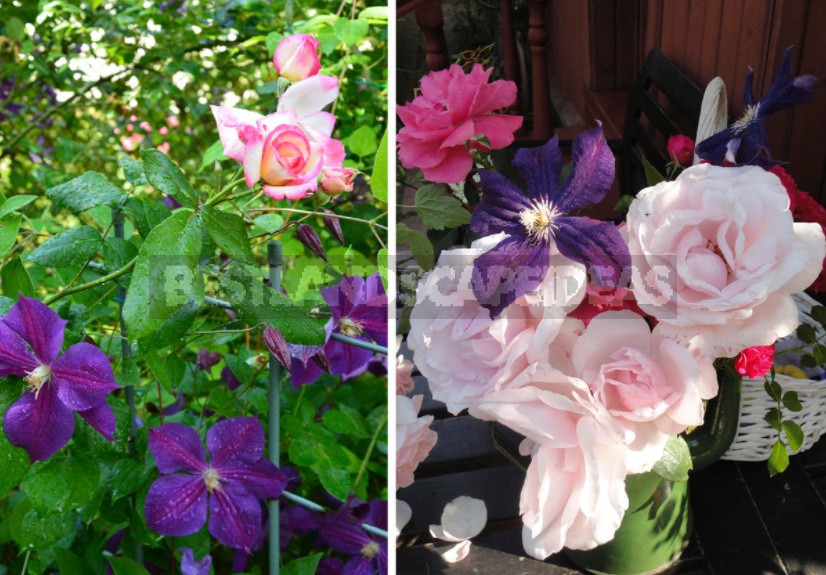
In the rose garden, it is appropriate to create monochrome compositions. A great example is the joint planting of the rose ‘Jasmina’ and clematis ‘Eetika’.
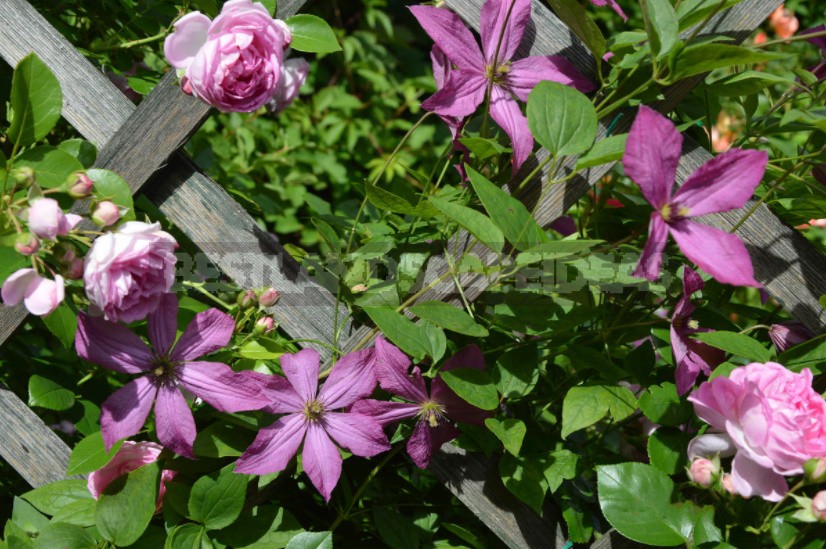
In my garden, the combination of pale pink, with porcelain petals, ‘New Dawn’, climbing fragrant ‘Jasmina’, profusely blooming clusters of ash-pink flowers of ancient shape, with dark pink, in tone, clematis ‘Eetika’ and ‘Marmori’ – pale pink with purple stripes in the center of the petals looks incredibly charming.
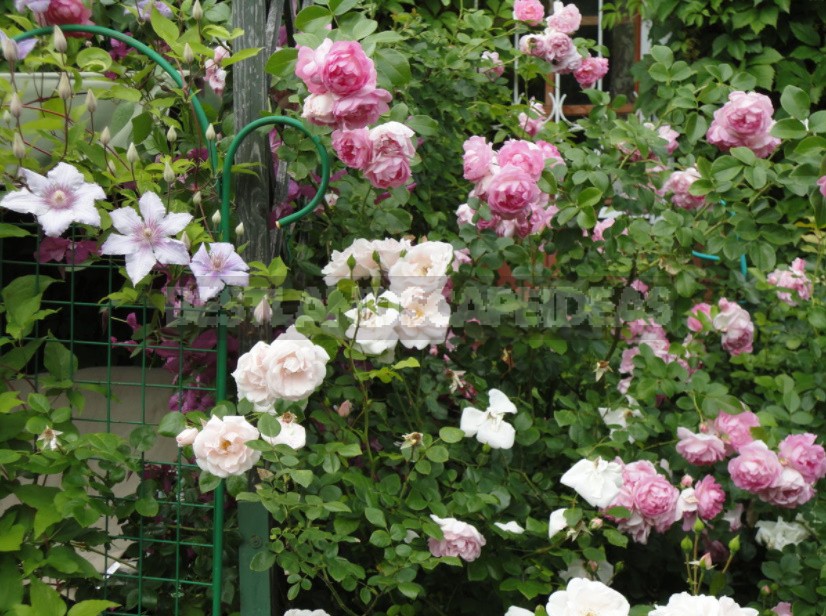
The luxurious “Palais Royal” shrub with antique ivory flowers looks amazing against the background of the “wall” of the “Ville de Lyon”.
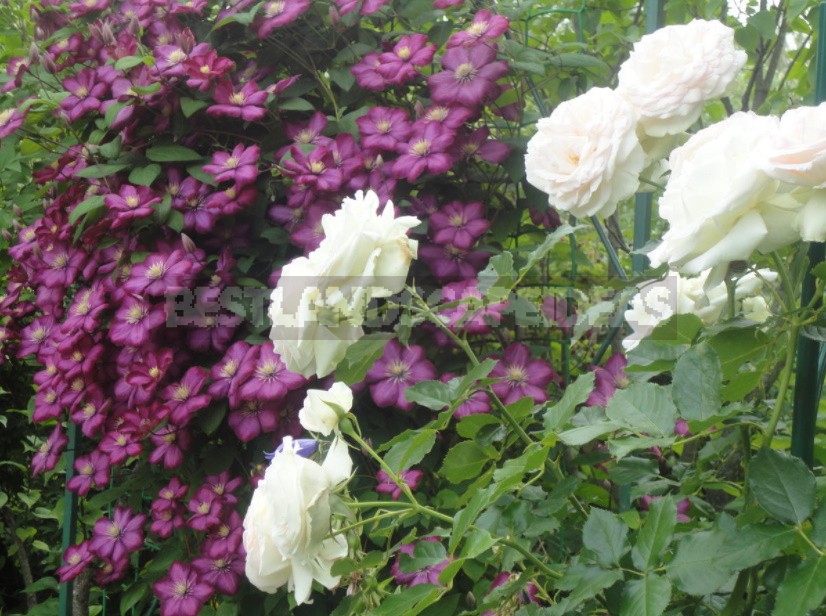
With any purple clematis, saffron, copper-yellow or Golden-yellow roses are perfectly combined, in particular the beautiful variety of “lace” rose ‘Westerland’ or ‘Barock’ shrub. Rose ‘Barock’ is good in itself, but the neighborhood of purple clematis will make it even more beautiful!
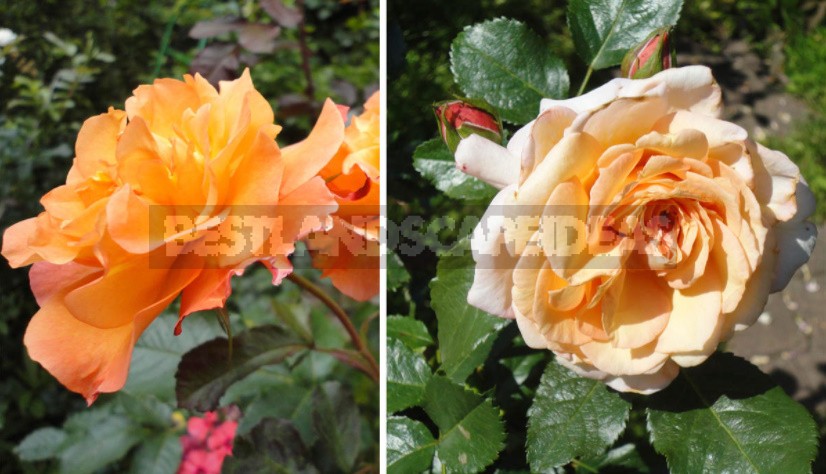
The combination of the scarlet rose ‘Amadeus’ looks harmonious with clematis ‘Arabella’ ( group Integrifolia).
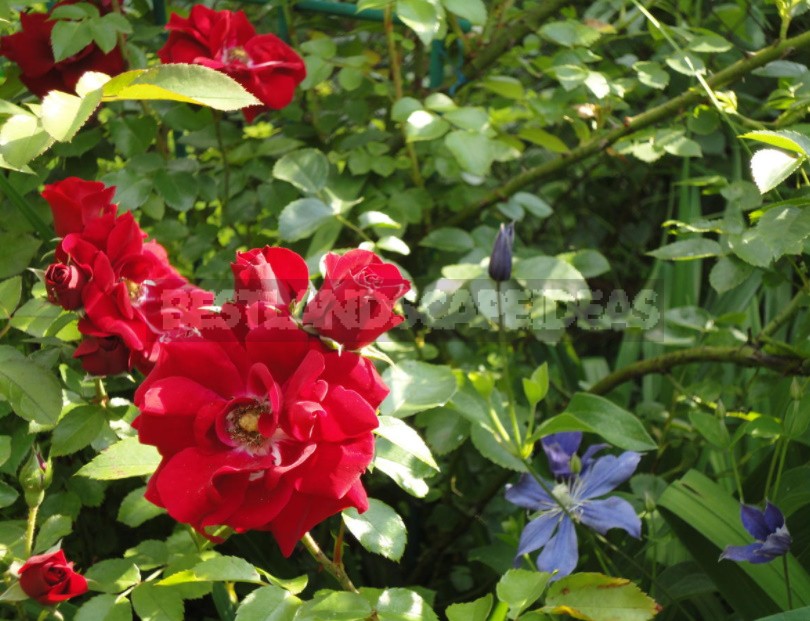
Excellent Estonian hybrid variety ‘Pohjanael’ among peach – colored roses-climbing ‘Amaretto’ and floribunda ‘Aprikola’.
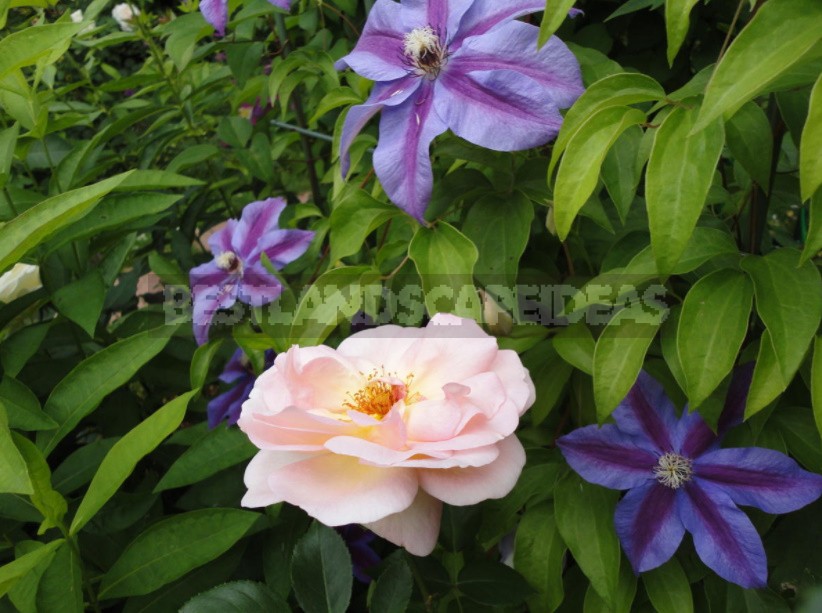
Purple velvety clematis ‘Westerplatte’ will be a great neighbor of roses in classic shades.
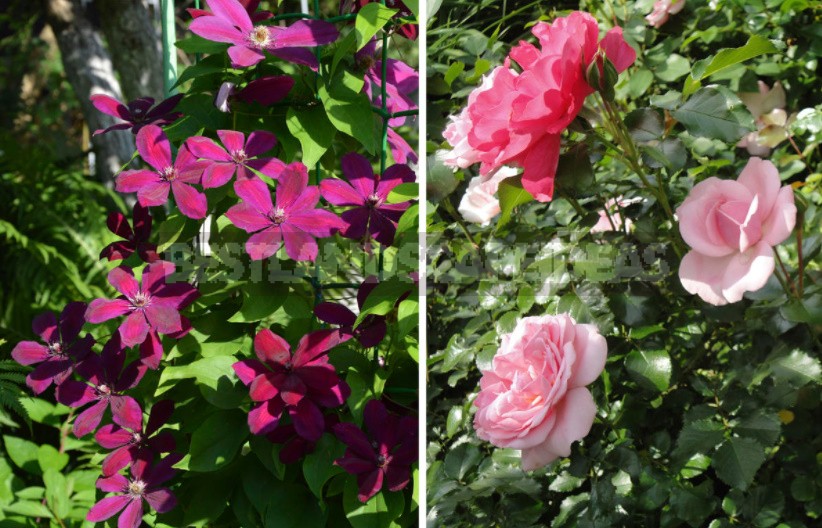
Grade ‘Jan Pawel II’, blooming before frost, will serve as a contrasting partner for purple roses.
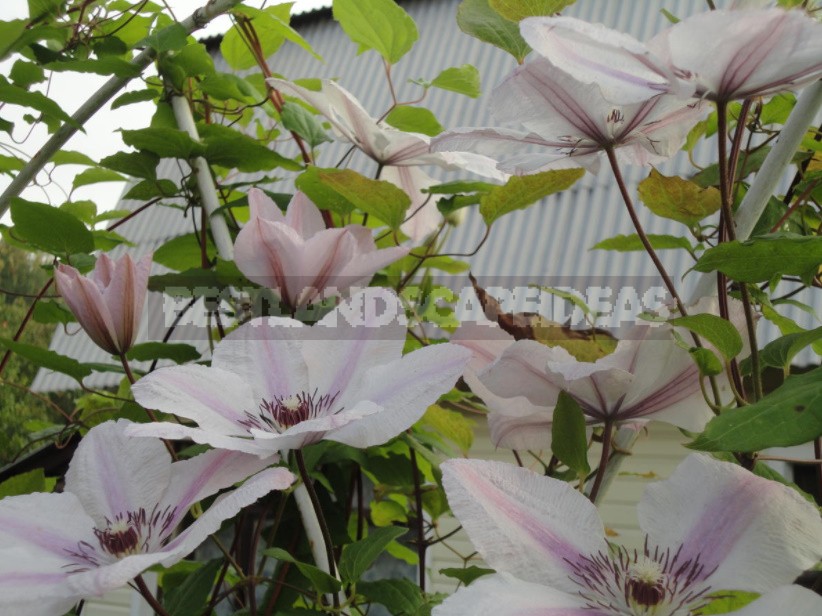
Clematis ‘Marmori’ is a great companion for cold-colored roses.
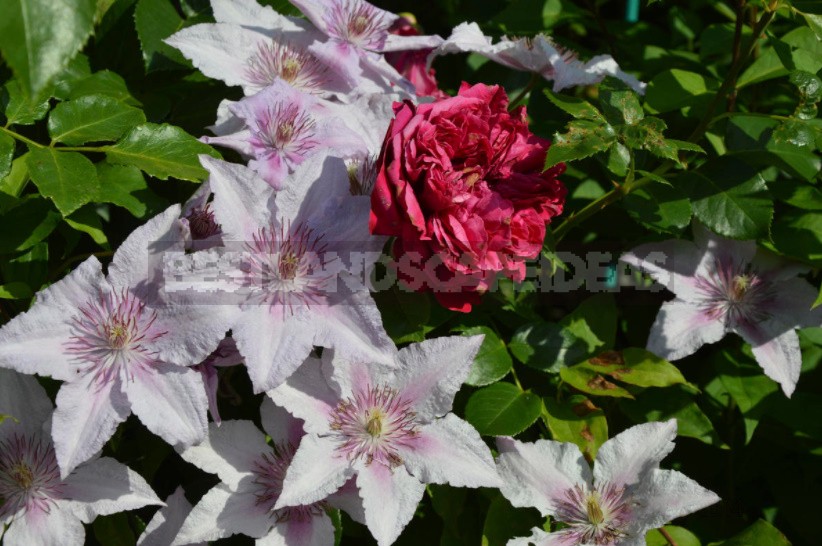
Original composition
Good in the design of the garden and varieties of clematis that are not widely distributed yet from the Texensis group, blooming towards the end of summer with pretty bells. They were obtained by crossing Clematis texensis with large-flowered varieties and hybrids. The flowering of ‘Duchess of Albany’ coincides with the second wave of flowering of the lush rose ‘Rosarium Uetersen’.
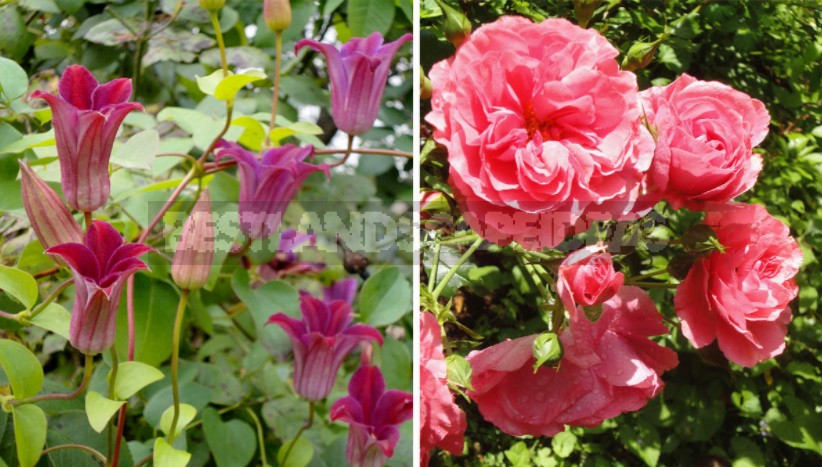
Another use of clematis of this group I have in my garden: ‘Sir Trevor Lawrence’ weaves” in free flight” on a high rose-centifolia ‘Fantin-Latour’, creating a relaxed cascade of bell flowers. By this time, the rose itself is already fading, but it turns out to be decorated with wonderful “pitchers” with velvet petals.
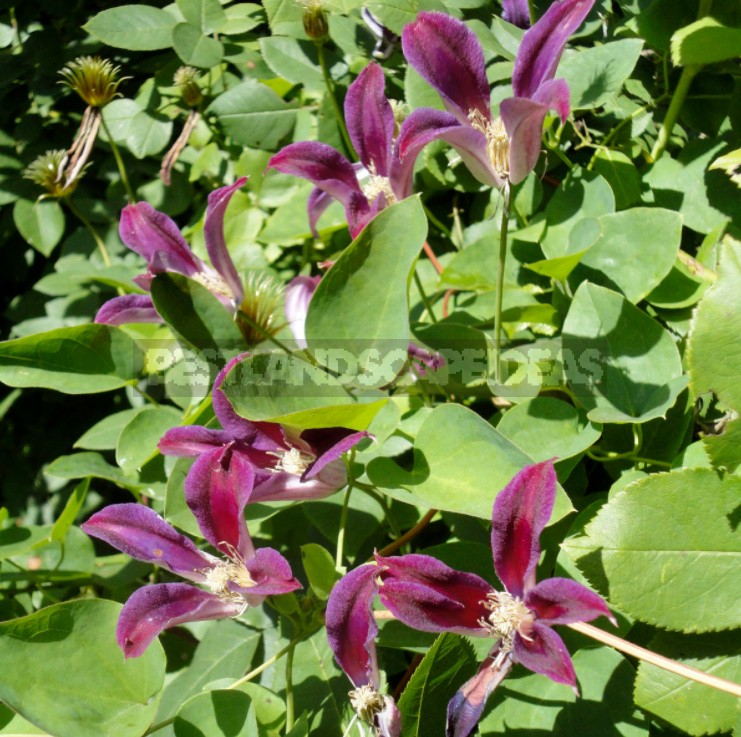
Recently, species of clematis with small, seemingly nondescript, but extremely cute small flowers and abundant flowering are gaining popularity.
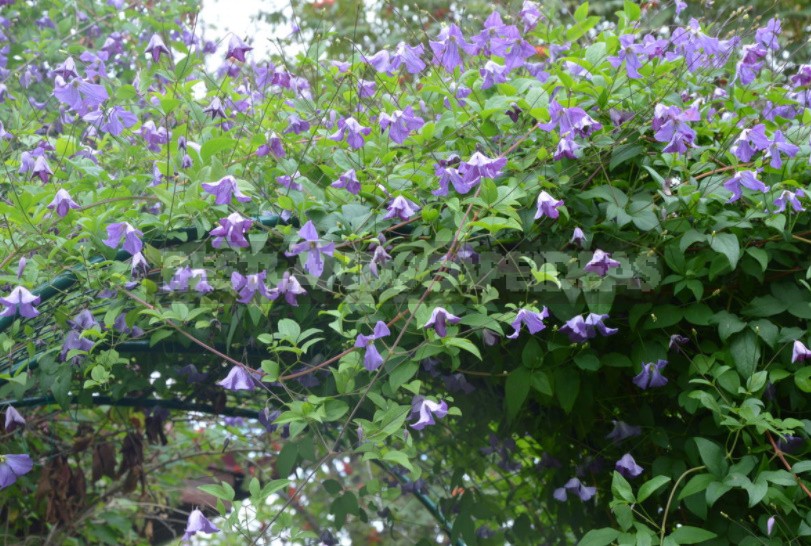
One of the most favorite among them is the ancestor of a whole group, Clematis viticella, which blooms profusely on long lashes all summer. It’s like he’s floating in the air on an arch. Blooms with bluebells of pale blue sky color, planted next to the rose ‘Pierre de Ronsard’.
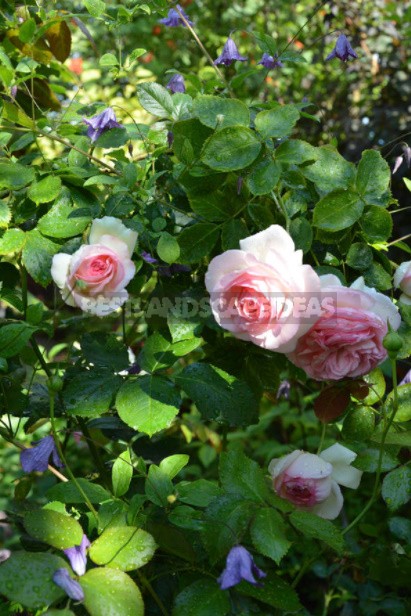
There are many options for combining clematis and roses, but before you plant such a pair next to each other, carefully study the varietal features of both, so as not to make unnecessary mistakes. And to create a harmonious picture in color, try to experiment first, using clematis whips of various varieties in bouquets with roses.
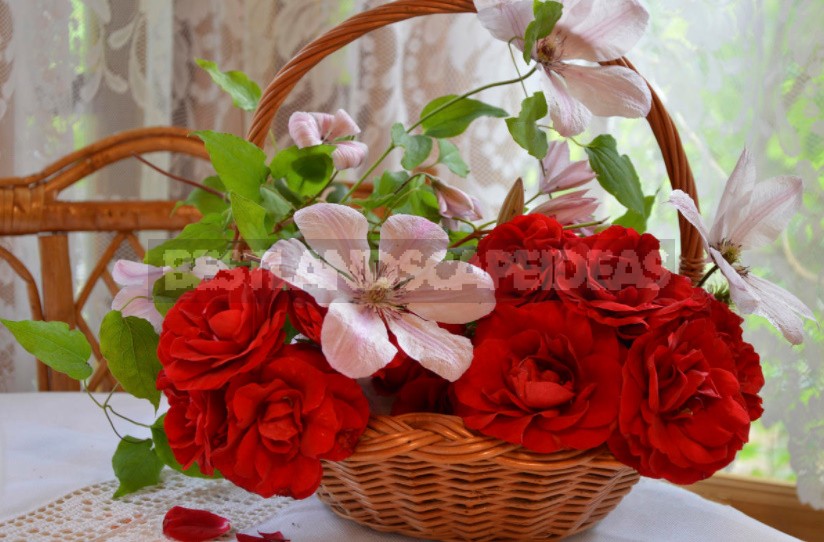
These two amazingly beautiful sun-loving crops seem to be created for each other, and they will make an excellent pair for a sensitive gardener. Do you grow roses with clematis? Tell us in the comments about your findings in combining these plants or, conversely, about their uncomplicated partnership.



Leave a Reply